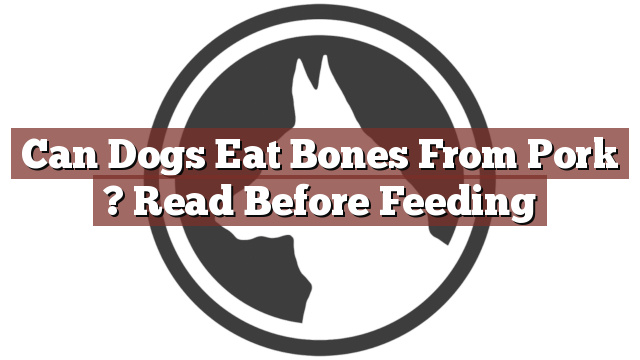Understanding Your Dog’s Dietary Needs
As a responsible dog owner, it is crucial to understand your furry friend’s dietary needs. While dogs are omnivorous, their nutritional requirements differ slightly from humans. Dogs primarily need a diet consisting of protein, healthy fats, carbohydrates, vitamins, and minerals. However, not all human foods are safe for dogs to consume. It is essential to be aware of what is appropriate and what is potentially harmful to your four-legged companion.
Can Dogs Eat Bones From Pork? Read Before Feeding
Can dogs eat bones from pork? This is a common question that many dog owners have. The simple answer is no. While dogs naturally enjoy chewing on bones, pork bones can pose serious health risks to your beloved pet. Pork bones, especially when cooked, can splinter easily and cause choking hazards, mouth injuries, or even blockages in the digestive system. These bone fragments can also damage the teeth or gums of your dog, leading to infections and discomfort.
Pros and Cons of Feeding Pork Bones to Your Dog
Before deciding whether to feed your dog pork bones, it is important to weigh the pros and cons carefully. On the positive side, chewing bones can help satisfy your dog’s natural urge to chew and can also be a great source of entertainment. Additionally, raw bones may provide some nutritional benefits, such as calcium and phosphorus, which are essential for your dog’s bone health.
However, the potential risks associated with feeding pork bones to dogs should not be overlooked. Cooked pork bones are more likely to splinter than raw bones, increasing the chances of injury or obstruction. Even if you choose to give your dog raw bones, it is crucial to supervise them closely to prevent any accidents. It is always recommended to consult with your veterinarian before introducing any new food in your dog’s diet.
In Conclusion: Weighing the Risks and Benefits of Feeding Pork Bones to Your Dog
While dogs may enjoy chewing on bones, it is important to prioritize their safety and well-being. Can dogs eat bones from pork? The answer is a resounding no. The potential dangers of feeding pork bones, particularly cooked ones, outweigh any potential benefits. It is crucial to provide safer alternatives for your dog to chew on, such as specially designed chew toys or bones specifically made for dogs. Remember, when it comes to your dog’s diet, it is always better to err on the side of caution and prioritize their overall health and happiness.
Thank you for taking the time to read through our exploration of [page_title]. As every dog lover knows, our furry friends have unique dietary needs and responses, often varying from one canine to another. This is why it's paramount to approach any changes in their diet with caution and knowledge.
Before introducing any new treats or making alterations to your dog's diet based on our insights, it's crucial to consult with a veterinarian about [page_title]. Their expertise ensures that the choices you make are well-suited to your particular pet's health and well-being.
Even seemingly harmless foods can sometimes lead to allergic reactions or digestive issues, which is why monitoring your dog after introducing any new food item is essential.
The content provided here on [page_title] is crafted with care, thorough research, and a genuine love for dogs. Nevertheless, it serves as a general guideline and should not be considered a substitute for professional veterinary advice.
Always prioritize the expert insights of your veterinarian, and remember that the health and happiness of your furry companion come first.
May your journey with your pet continue to be filled with joy, love, and safe culinary adventures. Happy reading, and even happier snacking for your canine friend!

